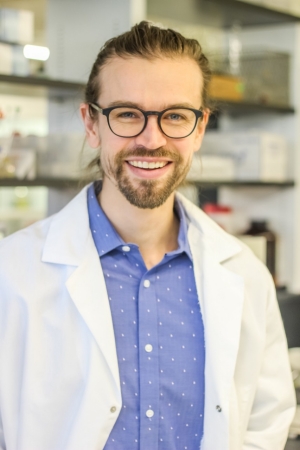Villanova Chemistry Professor Receives NIH Grant to Support Development of New Antibiotic Approaches

Villanova, PA – As the world continues to battle COVID-19, a growing bacterial resistance to the current available arsenal of antibiotics constitutes another major threat to public health in 2021. Methicillin-resistant Staphylococcus aureus (MRSA) is just one example of a type of bacteria that is resistant to many common antibiotics—and as a result, MRSA infections can be very difficult to treat. This can allow the infections to spread and sometimes become life-threatening.
Matthew O’Reilly, PhD, assistant professor of Chemistry in Villanova University’s College of Liberal Arts and Sciences, has received a $ 340,871 grant from the National Institutes of Health to support his project, “Development of allosteric dihydrofolate inhibitors: exploration of a novel inhibitory mechanism for a validated antibiotic target.”
Dihydrofolate reductase inhibitors are an important class of drugs. Inhibition of the enzyme dihydrofolate reductase is an effective therapeutic strategy employed by antibacterial, anticancer and antiprotozoal compounds, and all FDA-approved drugs targeting this enzyme inhibit via a competitive mechanism. The drugs are also commonly used for fighting malaria and other protozoal infections, as well as for fungal, bacterial and mycobacterial infections.
“Dihydrofolate reductase is an underutilized antibiotic target, and my research seeks to discover antibiotic molecules allowing for further characterization of this novel allosteric mechanism, setting the stage for applications in antibiotics and other therapeutic areas,” Dr. O’Reilly says.
Dr. O’Reilly studies the intersection of chemistry and biology and is specifically interested in discovery efforts toward new antibacterial compounds. Developing antibiotic approaches that target underexploited targets and/or work through unique mechanisms of action represent an important approach toward mitigating this growing health risk.
His undergraduate students will have the opportunity to assist him in this grant-funded research, and he has witnessed them become particularly excited about this research project in light of the recent scientific milestones related to COVID-19 within the last year. O’Reilly says. “I am inspired by the progress scientists have made toward vaccines and treatments to move society forward in such a short amount of time, and I am thrilled to contribute to the collective goal of better human health in whatever way that I can.”
Dr. O’Reilly’s research has been published in 12 academic publications. He received his doctorate in Organic Chemistry from Vanderbilt University.
About Villanova University’s College of Liberal Arts and Sciences: Since its founding in 1842, Villanova University’s College of Liberal Arts and Sciences has cultivated knowledge, understanding and intellectual courage for a purposeful life in a challenging and changing world. With more than 40 majors across the humanities, social sciences and natural sciences, it is the oldest and largest of Villanova’s colleges, serving more than 4,500 undergraduate and graduate students each year. The College is committed to a teacher-scholar model, offering outstanding undergraduate and graduate research opportunities and a rigorous core curriculum that prepares students to become critical thinkers, strong communicators and ethical leaders with a truly global perspective.
